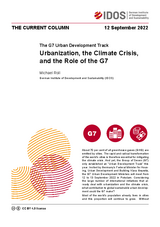The G7 Urban Development Track
Urbanization, the Climate Crisis, and the Role of the G7
Roll, MichaelThe Current Column (2022)
Bonn: German Institute of Development and Sustainability (IDOS), The Current Column of 12 September 2022
About 70 per cent of all greenhouse gases (GHG) are emitted by cities. The rapid and radical transformation of the world’s cities is therefore essential for mitigating the climate crisis. And yet, the Group of Seven (G7) only established an “Urban Development Track” this year. Invited by Germany’s Federal Minister for Housing, Urban Development and Building Klara Geywitz, the G7 Urban Development Ministers will meet from 12 to 13 September 2022 in Potsdam. Considering the large number of international initiatives that already deal with urbanization and the climate crisis, what contribution to global sustainable urban development could the G7 make?
Most of the world’s population already lives in cities and this proportion will continue to grow. Without much more sustainable urban development in the years ahead, the climate crisis cannot be averted. In analysing these challenges, this years’ IPPC report distinguished three types of cities: established cities, rapidly growing cities, and new and emerging cities. While established cities are generally located in the Global North, most of the other types of cities are based in the Global South. It is projected that, until 2050, there will be 2 to 3 billion new urban residents, 90 per cent of them in Africa and Asia. Most of these cities do not yet exist, such as two thirds of Africa’s future cities. And because urban infrastructure such as buildings and roads structure space for decades to come, the world is facing a massive urban carbon-lock-in in the next few years. At the same time, investments in sustainable urban development are often particularly low in the very countries where most of the future urban growth will take place.
Many global initiatives on sustainable urban development already exist, such as UN-Habitat’s “New Urban Agenda” or Sustainable Development Goal 11 on sustainable urban development. Several city networks and non-governmental organisations also focus on sustainable urbanization such as ICLEI – Local Governments for Sustainability, C40, or the Global Covenant of Mayors for Climate & Energy. What role could the G7 play in this context?
First, as long-established industrialized countries, the G7 carry the overwhelming historical responsibility for the climate crisis. It is pivotal that they signal their joint commitment to reducing GHG emissions in the established cities in the Global North, which requires massive efforts. However, a wider global focus is necessary. It would be irrational to ignore the immediate threat of future urban carbon-lock-ins in Africa and Asia.
Second, when a global lens is applied, the G7 should support platforms for global exchange and peer learning. The experiences of cities in the Global North are still often overrepresented in these fora. And yet, governments, municipalities, and civil society in the Global South have accumulated a lot of knowledge and practical experience about what is required to tackle the combined challenges of informal economies, social inequality, poverty, and sustainable urban development. And together with communities, researchers are continuously exploring new, innovative ways for urban transformation. Learning from experiences across the globe therefore is a necessary starting point.
To institutionalise a global exchange and learning approach, a third contribution of the G7 could be to take up the idea of a G7/G20 Pact for Sustainable Urbanisation. Urbanisation is a major challenge for many of the emerging economies in the G20 and many of the future cities will be built in these countries. A more institutionalised form of collaboration would therefore be vital.
Fourth, while the exchange of ideas and the development of a collaborative urban agenda are necessary, it is the massive financing gap that eventually will decide whether rapid global urbanisation in the next few years will lead to additional carbon-lock-in or to greener, more sustainable cities. Who if not the club of the world’s leading economies can mobilize funds to mitigate the climate crisis, and to build a more sustainable global urban future? Existing initiatives such as the City Climate Finance Gap Fund or the Cities Climate Finance Leadership Alliance are well-intended but underfunded. Public and private investors are increasingly interested in financing projects in cities around the world and could be mobilised. Another idea is to complement the new G7 Climate Club with a G7 Infrastructure Club to focus on sustainable urban development. Whatever the form, if done right, these investments could also bring about other benefits that are urgently needed such as better urban housing, green jobs, and more gender-equal cities.
The G7’s commitment to Sustainable Urban Development is long overdue and highly welcome. With a truly global focus, a willingness to exchange and learn, a partnership with the G20 and other relevant actors, and with the mobilisation of funds to close the financing gap, the G7 Urban Development Track could become a substantial contribution to global sustainable urban development and to mitigating the climate crisis.


